At “The Business of Sports” – Radford University’s recent half-day of moderated talks and discussions for students interested in entrepreneurial careers in athletics, held Oct. 23 at Kyle Hall – two initial issues rose far higher than others.
Those initials? AI and NIL.
AI, or artificial intelligence, is the rapidly advancing technology that allows computers to learn, make decisions and solve problems in a manner that simulates human intelligence, but at progressively higher levels.
NIL stands for “name, image and likeness,” and it gives college athletes within the NCAA the rights to control how their image is used and to profit independently from their abilities and brands. Coupled with recently loosened transfer restrictions, NIL has been a boon to student players, while also complicating teams’ recruitment processes and roster stability.
Since the business of sports runs on performance, statistics and revenue, AI and NIL are each poised to have seismic impacts moving forward.
“Everybody in our field calls it the wild west right now, and that really is kind of what it is, because nobody knows what to expect,” Radford University’s Director for Advancement Jon Zeitz said during his talk at the event, and although he was discussing NIL, he could just as easily have been talking about AI.
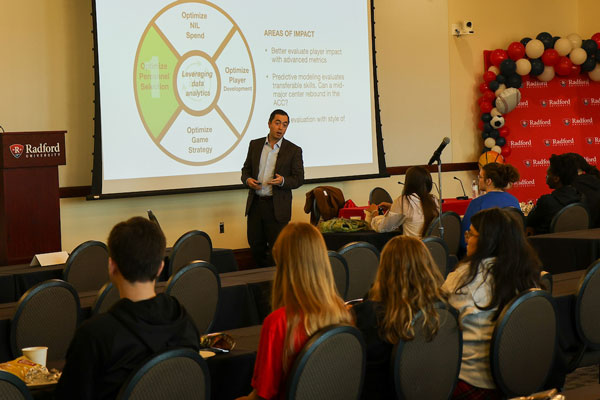
So it made sense that those two factors dominated “The Business of Sports,” which offered students four hosted sessions across the morning, forums that focused on building businesses, cultivating audiences and revenue, event management and brand partnerships. The program culminated with a luncheon at which keynote speaker Zach Chu, Radford’s new men’s basketball head coach, spoke at length about today’s accelerating pace and how it will affect his first season.
“The world is rapidly changing,” Chu told his audience, citing a recent statistic that maintains 90% of the world’s current data has been created in just the past two years. He also pointed to a theory by Ray Kurzweil, the scientist and author, whose Law of Accelerating Returns posits that “the rate of progress in the world doubles every decade.”
“So that's an exponential rate, which means that in 20 years, the rate of change will be four times what it is today,” Chu added.
That level of acceleration, the coach said, calls for individual strategies to achieve long-term success, and he’s been outspoken about using sports analytics and a “Moneyball” approach to select his new team, which includes 13 new players and just one member of Radford’s previous bench.
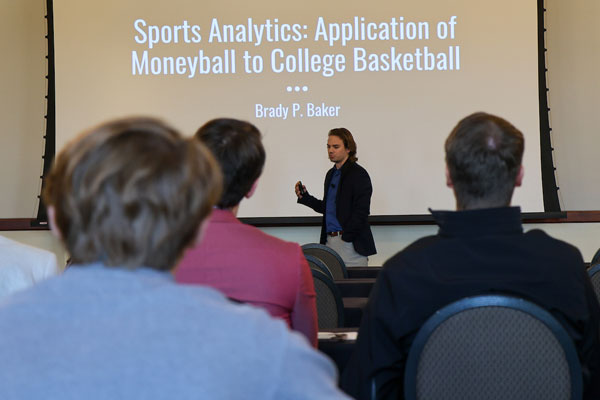
“We believe that our single greatest driver of success in our program is our data-driven approach,” Chu said. “Our data-driven approach allows us … we believe … to accurately evaluate players, whether they're coming out of high school or coming from the transfer portal or within our program already. And it also drives our game strategy, our coaching, it drives the decisions we make, the style of play we implement and, really, who we are as a team."
Chu’s address was followed by Brady Baker, director of scouting and analytics for Radford’s men’s and women’s basketball teams. Baker comes to the university after a long stint in the NBA as the Indiana Pacers’ manager of basketball data science, a tenure during which he helped build out an analytics team.
“I spent the last three, four years of my life continuously evaluating over 5,000 players,” he explained. “I did that not only with the analytical approach that we're talking about; I also was able to learn about hands-on scouting, and what that looks like, and that's as important.”
Donna McCloskey, dean of the Davis College of Business and Economics (DCOBE), said hosting a forum on the intersection of business and sports gave the school an opportunity to deepen a discussion of analytics and to welcome Chu.
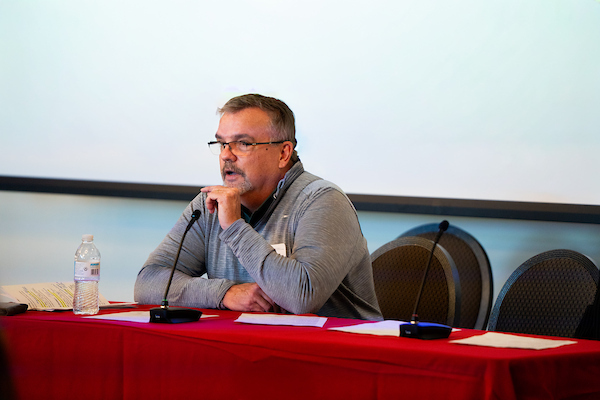
“DCOBE's unique value proposition is a curriculum and co-curricular programming that challenges, cultivates and connects,” the dean said, “and this was certainly an event all about connection – with another discipline on campus, athletics, and of course with our amazing alumni participants.”
The morning sessions for “The Business of Sports” were 60-minute discussions that drilled down on specific topics.
Rick Thompson ’88, general manager of Radford Sports Properties, with a 30-year career in college athletics, and Essie Jackson, who owns and operates Peak Strength and Conditioning gym in Christiansburg, Virginia, shared their experiences as entrepreneurs who successfully navigated changing times and such adversities as the pandemic.
An event management panel included Brittany Schulz ’21, operations manager for Rhino Sports & Entertainment Services; Shawn-Ta Wilson '88, an event expert whose assignments have included the 1996 Olympic Games in Atlanta, Georgia; and Garrett Knudson ’14, now Virginia Commonwealth University’s assistant athletic director for student-athlete development.
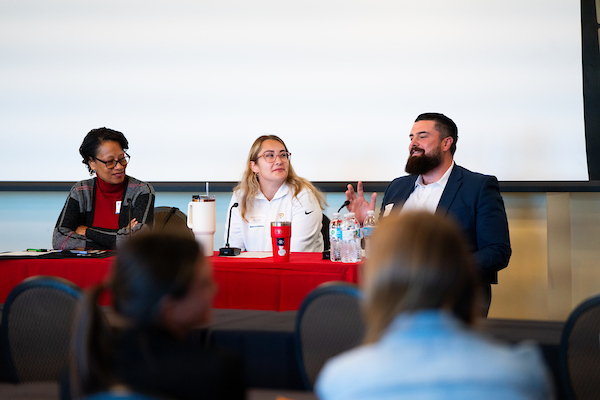
“The Power of Brand Partnerships” was led by Jon Zeitz and Jorge Andres, an anchor with CBS affiliate WBTV (Charlotte, North Carolina), and it largely focused on NIL.
“I think at some point it's going to be more regulated,” Zeitz said. “It won't be regulated to the point where it's going to be detrimental to the student athlete. It's just going to be more equitable between the institution and the student-athlete. However, NIL is here to stay; it's not going anywhere. So schools like Radford have already started the process of being able to exist in that world. So I think it will continue that places like Radford will be able to compete with their peers.”
Andres encouraged students who hope for a career in sports to be tenacious and creative.
“When you’re looking at Name, Image and Likeness, when you’re looking at how you can define your brand? Define your brand first,” he advised. “Find out what that is. Polish it. It may not be what you think it is at first. And then just get in there, shake hands, meet people. Before you know it, you'll look back and you'll say, ‘Hey, okay, I got there, but I got there a different way.’”
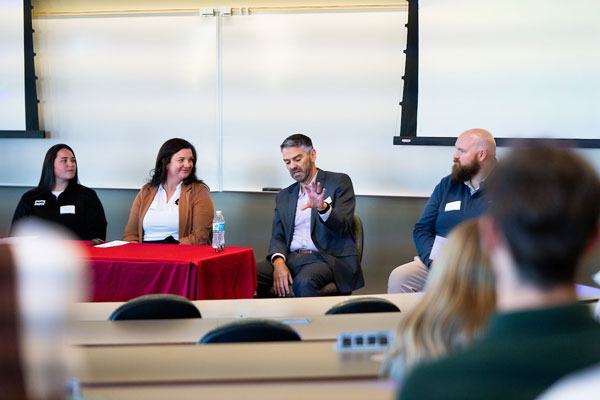
A session on building audiences and revenue featured the Salem Red Sox’s Assistant General Manager and Vice President of Ticket Sales & Service, Blair Hoke ’10; Hannah Rosen ’19, a customer renewals lead with BridgeAthletic; Casey Eliff ’10, director of sales for Topgolf; and Radford Associate Vice President for University Advancement Danny Sterling, whose work in athletics extends back to 1995.
Freshman Isaac Gillenwater, a sports management major who hopes to one day work in baseball, sent that panel down a more personal avenue by asking them to share how or why they got into the business of athletics.
“It's a career path that is extremely contagious. When you get in it, it's really hard to get out of it,” Hoke told him. “I was a fan of sports my whole life, particularly the Braves when I was growing up. And I said yes to a lot of opportunities, and worked hard and really leaned into my mentors, and then just grew from that.”
Elliff espoused the value of networking and cultivating professional connections: “In today’s market, you will not get a job by just applying. There are hundreds and thousands of people applying. They’re using AI to scope your resume. It is a very tough market. So relationships are everything.”
Sterling echoed that sentiment.
“Listen, if you’re a jerk, you had better be really good at what you do,” he said, “because the minute you’re not, you’re out of there, I promise.
“Effort and attitude are the only things you can control. So show up. Do the work.
Be curious,” Sterling added. “Ask people questions [and] continue to learn. I'm almost
54 years old, and I'm still going to webinars, going to seminars, going to things
like this, learning from people half my age and loving every minute of it.
"And that's what's going to keep you growing and moving, personally and professionally.
It's also going to keep you alive and keep you happy and confident in what you're
doing.”